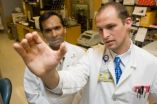(Press-News.org) ANN ARBOR, Mich. — Researchers at the University of Michigan Comprehensive Cancer Center have identified a potential target to treat an aggressive type of prostate cancer. The target, a gene called SPINK1, could be to prostate cancer what HER2 has become for breast cancer.
Like HER2, SPINK1 occurs in only a small subset of prostate cancers – about 10 percent. But the gene is an ideal target for a monoclonal antibody, the same type of drug as Herceptin, which is aimed at HER2 and has dramatically improved treatment for this aggressive type of breast cancer.
"Since SPINK1 can be made on the surface of cells, it attracted our attention as a therapeutic target. Here we show that a 'blocking' antibody to SPINK1 could slow the growth of prostate tumors in mice that were positive for the SPINK protein," says study author Arul Chinnaiyan, M.D., Ph.D., director of the Michigan Center for Translational Pathology and a Howard Hughes Medical Institute Investigator.
The study appears in the March 2 issue of Science Translational Medicine.
The researchers additionally found that SPINK1 can bind to a receptor called EGFR. They tested a drug that blocks EGFR, cetuximab, which is already approved by the U.S. Food and Drug Administration, and found that this also reduced the cancerous effects of SPINK1.
Using mice, researchers first tested a monoclonal antibody – a type of targeted treatment designed to go after a specific molecule (in this case, SPINK1). They then tested cetuximab. Tumors treated with the SPINK1 antibody shrunk 60 percent, while tumors treated with cetuximab shrunk 40 percent. By combining the two drugs, tumors were 74 percent smaller.
The effect was seen only in tumors that expressed SPINK1 and was not seen in tumors that did not express SPINK1.
Previous studies that looked at cetuximab for metastatic prostate cancer have been disappointing, with only 8 percent of patients showing some benefit. The researchers suggest that the poor results may be because the treatment is appropriate only for patients with SPINK1-positive tumors.
"About 10 percent of prostate cancer patients are SPINK1-positive and strategies to block SPINK1 signaling may have utility in this subset of patients. These studies should stimulate the development of antibody-based therapies against SPINK1 or targeting of EGFR in SPINK1-positive cancer patients," says study author Bushra Ateeq, a research fellow at the U-M Medical School.
SPINK1 is associated with a more aggressive form of prostate cancer. It can be detected in the urine of prostate cancer patients, making it an easy test for urologists to perform routinely.
"This non-invasive form of screening could be helpful in the molecular categorization of prostate cancer patients and administering therapies in a molecularly guided fashion," says Chinnaiyan, S.P. Hicks Endowed Professor of Pathology at the U-M Medical School and an American Cancer Society Research Professor.
The study suggests that side effects were limited in mice. Future studies will need to determine whether targeting SPINK1 in humans would affect normal tissue. The researchers will also look to further understand why SPINK1 is elevated in a subset of prostate cancers. Clinical trials testing SPINK1 therapies are not available at this time.
Prostate cancer statistics: 217,730 Americans will be diagnosed with prostate cancer this year and 32,050 will die from the disease, according to the American Cancer Society
INFORMATION:
Additional authors: Scott A. Tomlins, Bharathi Laxman, Irfan A. Asangani, Qi Cao, Xuhong Cao, Yong Li, Felix Y. Feng, Kenneth J. Pienta and Sooryanarayana Varambally
Funding: U.S. Department of Defense, Early Detection Research Network, Prostate SPORE, National Institutes of Health, Prostate Cancer Foundation
Disclosure: The University of Michigan has filed for patents on SPINK1, on which Chinnaiyan and Tomlins are named as inventors. The diagnostic field of use has been licensed to Gen-Probe Inc., who was not involved in the design or funding of these studies.
Reference: Science Translational Medicine, Vol. 3, No. 72, March 2, 2011
Resources:
U-M Cancer AnswerLine, 800-865-1125
U-M Comprehensive Cancer Center, www.mcancer.org
Clinical trials at U-M, www.UMClinicalStudies.org
Scientists target aggressive prostate cancer
U-M researchers show targeted therapy shrank tumors up to 74 percent in cells, mice
2011-03-03
ELSE PRESS RELEASES FROM THIS DATE:
Scientists show how men amp up their X chromosome
2011-03-03
PROVIDENCE, R.I. [Brown University] — What makes a man? His clothes? His car? His choice of scotch? The real answer, says Brown University biologist Erica Larschan, is the newly understood activity of a protein complex that, like a genetic power tool, gives enzymes on the X-chromosome an extra boost to increase gene expression. The process is described in the March 3, 2011, issue of the journal Nature.
Women have two X-chromosomes in their genomes while males have an X and a Y. Gender is defined by that difference, but for men to live, the genetic imbalance must be remedied. ...
North Carolina Child Sex Crime Conviction Has Harsh Consequences
2011-03-03
The recent sentencing of a 28-year-old Gaston County man for multiple sex offenses, including second-degree sex offense of a child and one count of indecent liberties with a child, reveals the severe consequences that a conviction or guilty plea can bring. Marcus Stephen Archer pleaded guilty to two of six counts and faces up to ten years in prison as well as lifetime registration as a sex offender. He will also be required to submit to satellite monitoring after his release from prison.
Archer admits not remembering the events due to heavy drug use during the time the ...
Has the Earth's sixth mass extinction already arrived?
2011-03-03
With the steep decline in populations of many animal species, from frogs and fish to tigers, some scientists have warned that Earth is on the brink of a mass extinction like those that occurred only five times before during the past 540 million years.
Each of these 'Big Five' saw three-quarters or more of all animal species go extinct.
In a study to be published in the March 3 issue of the journal Nature, University of California, Berkeley, paleobiologists assess where mammals and other species stand today in terms of possible extinction, compared with the past 540 ...
Acetaminophen in Tylenol: A Useful Pain Reliever or a Dangerous Drug? - Marcus & Mack
2011-03-03
Thousands, if not millions of people worldwide, use Tylenol or Tylenol-related products with the active ingredient Acetaminophen each week. The over-the-counter drug is labelled as an effective treatment method to reduce a fever and relieve minor aches and pains. While it is considered safe by medical professionals in some circles, new information about the risks of prolonged use, overuse and even common use have raised red flags for medical professionals.
It is well-known that excessive use of Acetaminophen (may be abbreviated as APAP on drug labels), such as an accidental ...
2 languages in peaceful coexistence
2011-03-03
Physicists and mathematicians from the University of Santiago de Compostela in Spain are putting paid to the theory that two languages cannot co-exist in one society.
Analysing the pattern of populations speaking Castilian, the most common language spoken in Spain, and Galician, a language spoken in Galicia, the North West autonomous community of Spain, the researchers have used mathematical models to show that levels of bilingualism in a stable population can lead to the steady co-existence of two languages.
The research, published today, Thursday 3 March 2011, in ...
Scientists from Toronto and Helsinki discover genetic abnormalities after creation of stem cells
2011-03-03
(March 2, 2011—Toronto, ON and Helsinki, Finland) Dr. Andras Nagy's laboratory at the Samuel Lunenfeld Research Institute of Mount Sinai Hospital and Dr. Timo Otonkoski's laboratory at Biomedicum Stem Cell Center (University of Helsinki), as well as collaborators in Europe and Canada have identified genetic abnormalities associated with reprogramming adult cells to induced pluripotent stem (iPS) cells. The findings give researchers new insights into the reprogramming process, and will help make future applications of stem cell creation and subsequent use safer.
The study ...
Atlanta SEO Company Cardinal Web Solutions Sees Positive Impact for Clients with New Google Algorithm
2011-03-03
Atlanta SEO company Cardinal Web Solutions takes a proactive approach in its client's SEO and Internet marketing campaigns. While the recent announcement from Google of an updated search engine algorithm has shaken up the SEO industry, Cardinal Web Solutions sees these changes as a reinforcement of the company's focus on quality.
Cardinal Web Solutions is a leading Atlanta SEO company that provides search engine optimization and internet marketing.
In February, Matt Cutts of Google described on the company's blog what he called a "pretty big algorithmic improvement" ...
Mutations found in human induced pluripotent stem cells
2011-03-03
Ordinary human cells reprogrammed as induced pluripotent stem cells (hiPSCs) may ultimately revolutionize personalized medicine by creating new and diverse therapies unique to individual patients. But important and unanswered questions have persisted about the safety of these cells, in particular whether their genetic material is altered during the reprogramming process.
A new study – published in the March 3 issue of the journal Nature and led by scientists at the University of California, San Diego in collaboration with other leading stem cell research groups – finds ...
Study shows ibuprofen may reduce risk of developing Parkinson's disease
2011-03-03
Boston, MA – A new study by Harvard School of Public Health (HSPH) researchers shows that adults who regularly take ibuprofen, a non-steroidal anti-inflammatory drug (NSAID), have about one-third less risk of developing Parkinson's disease than non-users.
"There is no cure for Parkinson's disease, so the possibility that ibuprofen, an existing and relatively non-toxic drug, could help protect against the disease is captivating," said senior author Alberto Ascherio, professor of epidemiology and nutrition at HSPH.
The study will be published online March 2, 2011, in ...
New interpretation of Antarctic ice cores
2011-03-03
Climate researchers at the Alfred Wegener Institute for Polar and Marine Research in the Helmholtz Association (AWI) expand a prevalent theory regarding the development of ice ages. In the current issue of the journal Nature three physicists from AWI's working group "Dynamics of the Palaeoclimate" present new calculations on the connection between natural insolation and long-term changes in global climate activity. Up to now the presumption was that temperature fluctuations in Antarctica, which have been reconstructed for the last million years on the basis of ice cores, ...
LAST 30 PRESS RELEASES:
Low-intensity treadmill exercise preconditioning mitigates post-stroke injury in mouse models
How moss helped solve a grave-robbing mystery
How much sleep do teens get? Six-seven hours.
Patients regain weight rapidly after stopping weight loss drugs – but still keep off a quarter of weight lost
GLP-1 diabetes drugs linked to reduced risk of addiction and substance-related death
Councils face industry legal threats for campaigns warning against wood burning stoves
GLP-1 medications get at the heart of addiction: study
Global trauma study highlights shared learning as interest in whole blood resurges
Almost a third of Gen Z men agree a wife should obey her husband
Trapping light on thermal photodetectors shatters speed records
New review highlights the future of tubular solid oxide fuel cells for clean energy systems
Pig farm ammonia pollution may indirectly accelerate climate warming, new study finds
Modified biochar helps compost retain nitrogen and build richer soil organic matter
First gene regulation clinical trials for epilepsy show promising results
Life-changing drug identified for children with rare epilepsy
Husker researchers collaborate to explore fear of spiders
Mayo Clinic researchers discover hidden brain map that may improve epilepsy care
NYCST announces Round 2 Awards for space technology projects
How the Dobbs decision and abortion restrictions changed where medical students apply to residency programs
Microwave frying can help lower oil content for healthier French fries
In MS, wearable sensors may help identify people at risk of worsening disability
Study: Football associated with nearly one in five brain injuries in youth sports
Machine-learning immune-system analysis study may hold clues to personalized medicine
A promising potential therapeutic strategy for Rett syndrome
How time changes impact public sentiment in the U.S.
Analysis of charred food in pot reveals that prehistoric Europeans had surprisingly complex cuisines
As a whole, LGB+ workers in the NHS do not experience pay gaps compared to their heterosexual colleagues
How cocaine rewires the brain to drive relapse
Mosquito monitoring through sound - implications for AI species recognition
UCLA researchers engineer CAR-T cells to target hard-to-treat solid tumors
[Press-News.org] Scientists target aggressive prostate cancerU-M researchers show targeted therapy shrank tumors up to 74 percent in cells, mice



